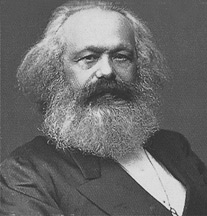Finding solace in philosophical Marxism
 Once in a while at least we must take time off to consider our plight
in the world. How many of us are satisfied with our jobs, income,
lifestyle and education? However much we try, most of us cannot achieve
higher goals in education and employment. Sometimes we feel that we are
victims of circumstances. If we cannot earn a decent salary or build a
comfortable house, there is something radically wrong with ourselves or
our social system. Once in a while at least we must take time off to consider our plight
in the world. How many of us are satisfied with our jobs, income,
lifestyle and education? However much we try, most of us cannot achieve
higher goals in education and employment. Sometimes we feel that we are
victims of circumstances. If we cannot earn a decent salary or build a
comfortable house, there is something radically wrong with ourselves or
our social system.
Although most of us do not think of these problems deeply,
philosophers down the ages have discussed the causes of social
inequality and tried to find solutions to them. Jeremy Bentham and his
student John Stuart Mill tried to reform society by applying the
greatest-happiness principle to solve social problems. They were not the
only thinkers who were worried about the great inequality in society in
the aftermath of the Industrial Revolution in the 19th century. Reform
movements sprang up in France and Germany under the banners of socialism
and communism.
It was during that time Marxism, founded by Karl Marx, became an
influential force to reckon with. However, Marxism in today’s political
context is something different from philosophical Marxism. Although
Marxism as a political force has failed in most countries, philosophical
Marxism is still valid if we are serious about solving the multiplying
social problems.
Jewish community
A peep into Marx’s life is worth at this point. He was a highly
intelligent son of a Jewish lawyer. However, his parents distanced
themselves from the local Jewish community by changing the family name
Levi to Marx. After studying law at the University of Bonn he moved to
the prestigious University of Berlin. As a young man Marx wrote romantic
poetry and was a spendthrift. The University of Berlin more or less
tamed the rebellious young man. Then he found himself among social
reformers, radicals and intellectuals.
|

Economics is the primary
conditioning factor of life.
- Karl Marx (1818-1883) |
Soon Karl Marx came under the influence of Georg Wilhelm Friedrich
Hegel (1770-1831) who was the most dominant thinker at the time. In
those days, one was either a Hegelian or an anti-Hegelian. Young Marx
derived the crucial concept of alienation and the notion of historical
evolution from Hegel. Thriving on the intellectual stimulation and
radicalism, Marx’s ambition was to be a professor of philosophy.
However, destiny had other plans for Marx. On the death of his
father, he had no steady income. So he agreed to work for a liberal
publisher named Moses Hess. Marx had to edit a “democratic journal.” A
turning point in his thinking came about when he read articles by Ludwig
Feuerbach who was a well-known materialist. According to Feuerbach,
material conditions controlled everything including how people behave,
think and what they believe. After observing how landowners repressed
workers, Marx realised that material conditions dominated everything in
human life.
Oppressors
Marx had to pay a heavy price for his concern for the downtrodden and
his regular attacks on their oppressors. Fearing reprisals from the
powerful Russian government, the rulers of Prussia shut down Hess’s
journal in 1843. Marx married Jenny von Westphalen in the same year.
When living in Prussia became extremely difficult, Marx and Jenny moved
to Paris which provided him with a freer intellectual climate. Before
long Marx found himself among like-minded thinkers.
Soon Marx was drawn towards Comte de Saint-Simon who saw the
emergence of a powerful new middle class known as the bourgeoisie. From
him Marx learnt that economic conditions determine history. He also came
to believe that historical change is the result of class conflict.
Revolutionary groups of German and French origin agitated for radical
changes. Those who demanded that property should be held in common came
to be known as communists. They influenced Marx to develop a keen sense
of the proletariat or the working class.
Capitalism
Before long Marx was expelled from Paris.Then he moved to Brussels
where he organised unions for German workers. Marx and his friend Engels
wrote the Manifesto of the Communist Party. Soon he came to be
considered a “dangerous revolutionary” by Germany and France. Thereafter
Marx and Engels moved to London where capitalist economy was thriving.
Thus the greatest critic of capitalism found refuge in a capitalistic
environment.
Marx wrote Das Kapital and published it in 1867 establishing himself
as a brilliant philosopher. It soon became the “Communist Bible.”
However, Marx died in his favourite armchair on March 14, 1883 in a
state of grief and despair. His wife and three children predeceased him
breaking his spirit. Although communism is more or less a spent force
today, according to philosophical Marxism, workers are exploited, even
though they do not realise it. |

